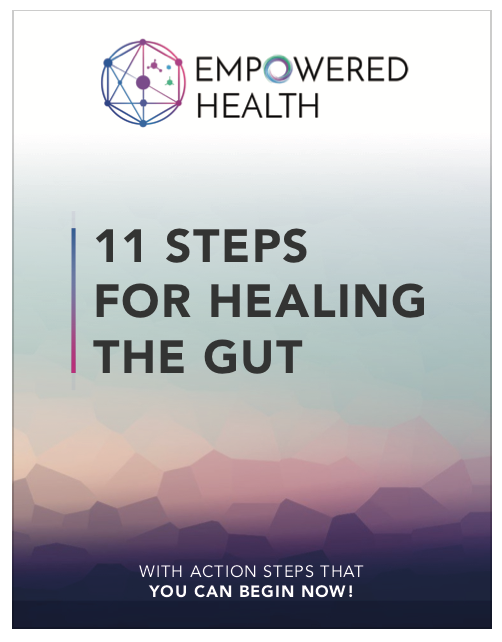5 Reasons Your Gut Is Not Healing & What To Do About It!
/A Very Wise Man Once Said!
Nearly 2500 years ago Hippocrates, who was clearly way ahead of his time, proclaimed “All Disease Begins In The Gut”. Although there is so much truth and wisdom in this statement, understanding and optimizing gut health has not been a hugely popular or widely accepted focus of health restoration until rather recently.
Within the last decade or so, research and interest in the area of gut health and how it impacts overall physical, mental, and emotional health has exploded. Identifying and Addressing pathogenic microbes, supporting the proliferation of healthy gut bugs, and healing the gut lining has become a huge thrust within the functional and holistic health and wellness spaces far and wide!
Gut health has been and continues to be a main focus for me in my own health journey and in my work with clients as a functional health practitioner. On a personal level, I have dealt with a severe and often disabling case of recurring SIBO (small intestinal bacterial overgrowth) that did not respond to many widely used holistic measures that have been helpful for others. I also see the same issue in many clients that come my way.
This observation has lead me to raise the question, “Why is it so common for many people to put forth huge effort towards healing their guts in the areas of diet, gut pathogen eradication protocols, pre and probiotics, and the list goes on yet they continue to struggle with gut health and thus remain stuck in other areas of their health as well? What are the reasons for this?”
Here is what my formal training and personal and professional experiences have taught me to be the main factors involved:
#1: Low Biodiversity of Beneficial Gut Microbes!
A healthy gut requires diverse and rich populations of beneficial gut microbes. Digestive and other health issues arise when gut bugs get out of whack thus creating an imbalance between beneficial and potentially harmful microbes. Once healthy, native gut microbes have been greatly reduced or totally wiped out, the gut and rest of the body become extremely vulnerable to infection and other toxic insults.
Repopulation is absolutely possible but it is often not as simple as taking probiotics as some might believe. While commercial probiotics can often play a critical role in supporting gut health, they are transient in nature. This means that they provide a wide array of benefits while they move through the digestive tract but they do not become permanent residents. In some scenarios, entire populations of healthy gut bugs may be totally wiped out or never present in the first place therefore requiring more advanced interventions such as fecal microbiota implants. While there are many factors that contribute to low biodiversity the ones I have observed to have the greatest impact are:
Antibiotic use. While antibiotics can be lifesaving and necessary in some scenarios, it is important to know that as little as one round as well as the antibiotics that your mom may have taken while you were in utero can drastically reduce biodiversity of healthy gut microbes! The gut can't come back into balance and heal with continued low biodiversity of beneficial bugs. This is where functional testing such as but not limited to Viome, Ubiome, or the Gut Zoomer panels from Vibrant-Wellness can be extremely helpful for guiding the path forward in your healing journey!
Acute gut infections such as those caused by food poisoning, the stomach flu, or a super bug such as Clostridium Difficile (aka: Cdiff) can sometimes cause serious complications. Infections such as these, which often strike a gut that is already compromised in some way, can sometimes cause such a profound, negative shift in the microbiome that it leaves the sufferer dealing with the fallout for years to come. This is what happened to me as recurring SIBO was triggered by a series of insults involving giardiasis, salmonella food poisoning, and then Cdiff. My ally soldiers had been overtaken and my gut motility and lining had been damaged to the point of needing much deeper interventions beyond probiotics and other standard gut repair strategies.
#2: Autonomic Nervous System Dysfunction
The automatic nervous system is to our body as the air traffic control tower is to an airport. The autonomic nervous system (which is largely regulated by the vagus nerve and intricately connected with the brain) plays an integral role in maintaining optimal health due to the fact that it is the master control center for regulating the function of the visceral organs such as the heart, lungs, liver, pancreas, gall bladder, the entire digestive tract, sexual organs, and more.
Much the same way planes will likely crash and not take off or land on time if the air traffic control tower is not on the ball and provides inaccurate flight data to the pilots, our bodies will malfunction and crash if the autonomic nervous system is dysregulated and does not relay correct information to the organ systems.
Autonomic nervous system dysfunction, which is caused by biochemical, physical, and/or psychological trauma can often lead to improper nerve signaling between the brain and gut leading to impaired digestive tract motility. Optimal motility is needed to properly move food through the digestive system and to assist with the removal of waste.
Without proper motility, undigested food particles often remain in areas where they should not remain creating a food source for undesirable gut bugs to feed on. Additionally, microbes that should remain in the large colon can migrate into the small intestines; where they do not belong. These two factors create the prime scenario for leaky gut, SIBO (small intestinal bacterial overgrowth, and other life altering digestive issues to develop.
Furthermore, when the ANS becomes dysfunctional, digestion will inevitably become impaired to varying degrees. When this happens, we can no longer optimally convert the nutrients from the food we eat into the appropriate compounds and molecules needed for optimal cellular function!
Based on years of researching this topic and my formal studies, I am of the professional opinion that ANS dysfunction is involved to varying degrees in ALL poor health states. Some of the hallmark signs of it are:
Blood pressure dysregulation (especially upon standing from a seated or lying position)
Digestive motility issues such as recurring SIBO, Gastroparesis, and chronic constipation
Poor blood sugar regulation that does not respond well to other interventions
Frequent urination (especially at night)
Brain fog, ADHD, and other cognitive challenges
Frequent hunger despite eating ample amounts of food
Chronically sore upper back, shoulders, and neck that do not respond to other interventions
Chronic Fatigue Syndrome, Fibromyalgia, and chronic immune activation leading to autoimmunity
Inability to heal a leaky gut despite significant efforts
#3: High Toxic Burden & Sluggish Detoxification Pathways
I think we can all agree that toxins and health have an inverse relationship. As toxic burden goes up, health goes down. While this is a topic for an article all on its own, the most important take away here is that we are exposed to thousands of toxic compounds on a daily basis via the food we eat, the water we drink, the air we breath, and the electromagnetic frequencies and blue light we are exposed to as humans living in today’s fast-paced, and technologically-driven world.
When our bodies take in more toxins than they eliminate and we spend more time in a state of “fight or flight” versus “rest and digest”, it is a matter of time before the gut will be adversely affected and other health issues develop.
While all toxic insults can indeed play a role, I am finding that mycotoxins from environmental and food-born molds, heavy metals from dental work, vaccines, and other sources, and glyphosate used in commercial agriculture to be the most prevalent ones playing a role in the inability to heal the gut and thus move the needle forward in one’s health!
To illustrate this point a bit further, mycotoxins from molds and fungus have the ability to greatly lower MSH (Melanocyte Stimulating Hormone). This is a master regulatory hormone produced primarily in the pituitary, hypothalamus, and skin. It is heavily involved in controlling inflammation levels in the body as well as maintaining the integrity of the gut lining.
People with impaired detoxification pathways and those challenged by conditions such as Chronic Lyme and Company, Chronic Inflammatory Response Syndrome, Chronic Fatigue Syndrome, Autoimmunity, Fibromyalgia and more often have low very low levels of this hormone. Low levels of MSH are often associated with an inability to heal leaky gut despite huge efforts in the areas of diet and lifestyle changes as well as increased inflammation and high pain levels.
Some of the primary root causes of low MSH include but are not limited to high levels of biotoxins in the body, MARCoNS in the nasal cavity, and brain trauma (physical, biochemical, or psychological), and chronic intracellular infections.
#4: Chronic Intracellular Infections
This too can be an article all on its own. The key takeaway here is that chronic intracellular infections such as Lyme and Company put continuous stress on the immune system and thus take away from the energy and resources that the body needs to heal the gut.
Additionally, the metabolic waste products of chronic infections (aka: bug poop!) as well as the endotoxins that are created when the infections are eradicated by the immune system or by pathogen eradication protocols are also a source of biotoxins that accumulate in the body when detox pathways are impaired. In the presence of chronic health challenges, detox pathways are almost always impaired to some degree.
#5: Chronic Psychological Distress & The Mind-Body Connection
I feel this aspect of healing often goes largely under-recognized and thus under-addressed for the fact that it is often much easier (at least in the short-term) for both sufferers and practitioners to focus solely on bio-chemical and physiological factors of health challenges.
The field of pyscho-neuro-immunology has long proven that our mental and emotional states of being absolutely contribute to setting the stage for and keeping people stuck within chronic states of poor health as well as many other life challenges. Furthermore, the bodily system most often the first to be impaired by chronic psychological stress is the digestive tract.
Chronic life distress, unresolved trauma, anxiety/depression and trapped emotional energy have the ability to drastically slow digestion, reduce the stomach acid that we need to fight off undesirable microbes, lower white blood cell counts, and reduce cellular function that supports all health-promoting bodily processes. The body (especially the gut and autonomic nervous system) cannot and will not heal amidst a chronically engaged stress response.
In both my personal and professional experience I have observed this to be absolutely true!
So Now What? What Steps Can I Take To Heal My Gut?
If any of this resonates with you, and you would like to learn strategies for taking a deeper dive into your own gut and overall health, then I encourage you to download my FREE ebook: 11 Steps For Healing Your Gut With Action Steps You Can Begin NOW!
If after reading the information within you feel you need or want additional guidance on your healing journey, then I invite you to book an initial FREE Exploration Session. We can chat about your needs and see if my services are a good match for helping to move you forward in your health and life.


























































